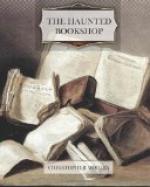“Dad works much too hard, don’t you think?” said Titania.
Aubrey welcomed this as a pleasant avenue of discussion leading into the parkland of Miss Chapman’s family affairs; but Roger insisted on his telling the story of the chef and the copy of Cromwell.
“And he followed you here?” exclaimed Titania. “What fun! I had no idea the book business was so exciting.”
“Better lock the door to-night, Roger,” said Mrs. Mifflin, “or he may walk off with a set of the Encyclopaedia Britannica.”
“Why, my dear,” said Roger, “I think this is grand news. Here’s a man, in a humble walk of life, so keen about good books that he even pickets a bookstore on the chance of swiping some. It’s the most encouraging thing I’ve ever heard of. I must write to the Publishers’ Weekly about it.”
“Well,” said Aubrey, “you mustn’t let me interrupt your little party.”
“You’re not interrupting,” said Roger. “We were only reading aloud. Do you know Dickens’ Christmas Stories?”
“I’m afraid I don’t.”
“Suppose we go on reading, shall we?”
“Please do.”
“Yes, do go on,” said Titania. “Mr. Mifflin was just reading about a most adorable head waiter in a London chop house.”
Aubrey begged permission to light his pipe, and Roger
picked up the book.
“But before we read the items of the coffee-room
bill,” he said,
“I think it only right that we should have a
little refreshment.
This passage should never be read without something
to accompany it.
My dear, what do you say to a glass of sherry all
round?”
“It is sad to have to confess it,” said Mrs. Mifflin to Titania, “Mr. Mifflin can never read Dickens without having something to drink. I think the sale of Dickens will fall off terribly when prohibition comes in.”
“I once took the trouble to compile a list of the amount of liquor drunk in Dickens’ works,” said Roger, “and I assure you the total was astounding: 7,000 hogsheads, I believe it was. Calculations of that sort are great fun. I have always intended to write a little essay on the rainstorms in the stories of Robert Louis Stevenson. You see R. L. S. was a Scot, and well acquainted with wet weather. Excuse me a moment, I’ll just run down cellar and get up a bottle.”
Roger left the room, and they heard his steps passing down into the cellar. Bock, after the manner of dogs, followed him. The smells of cellars are a rare treat to dogs, especially ancient Brooklyn cellars which have a cachet all their own. The cellar of the Haunted Bookshop was, to Bock, a fascinating place, illuminated by a warm glow from the furnace, and piled high with split packing-cases which Roger used as kindling. From below came the rasp of a shovel among coal, and the clear, musical slither as the lumps were thrown from the iron scoop onto the fire. Just then the bell rang in the shop.
“Let me go,” said Titania, jumping up.




